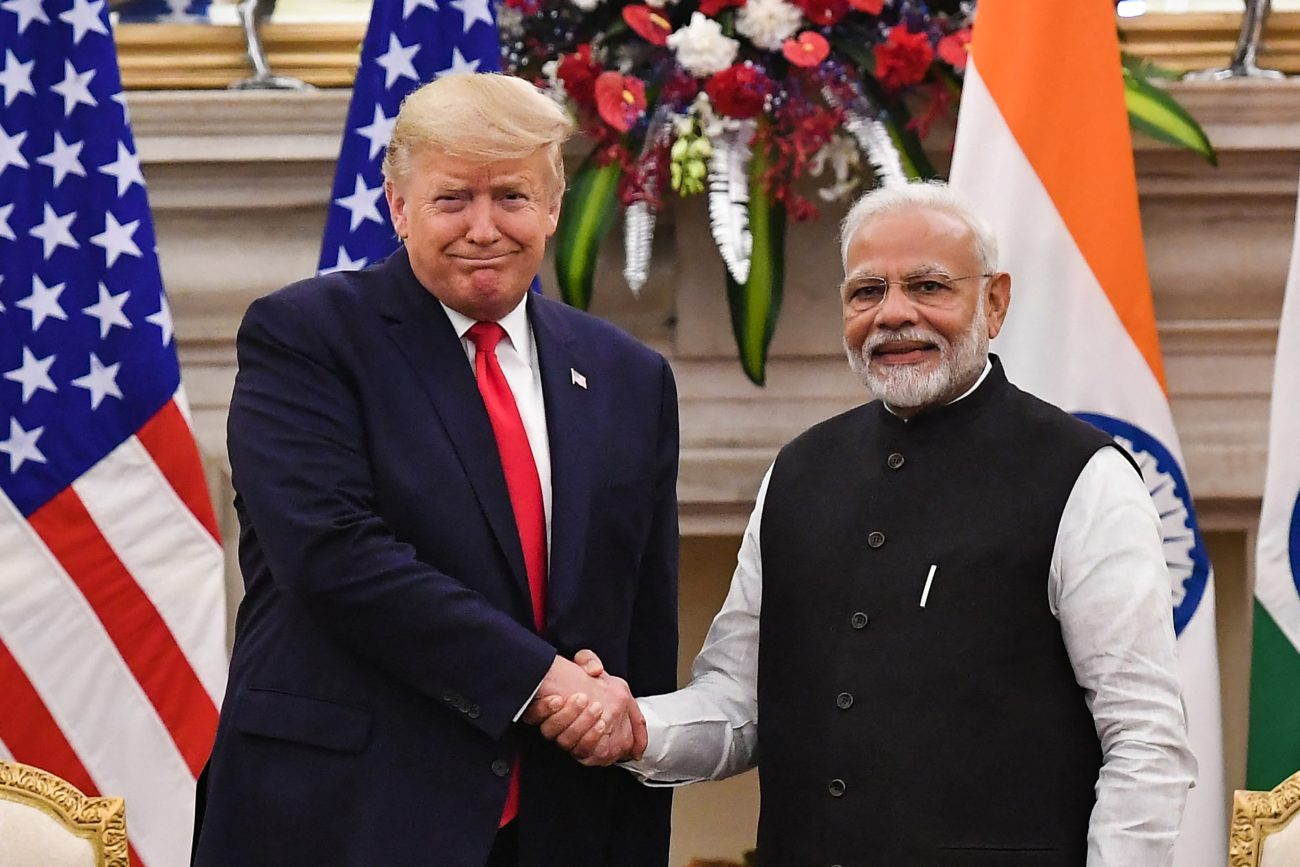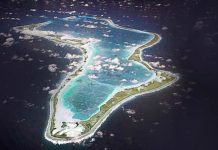By treating India now more or less as an enemy with his daily statements and the highest tariff of 50 percent (the only country after Brazil), has President Donald Trump initiated the demise of the Quadrilateral Security Dialogue (Quad), the strategic forum of India, Australia, Japan, and the United States?
This question is now in the minds of the strategic elites of all four countries amid reports that Trump has dropped plans to attend the scheduled Quad Summit in November in India.
His statement that “we’ve lost India (and Russia) to deepest, darkest China” has further raised the query, given the widely held perception that the Quad’s evolution has always been conditioned by the fear of China, particularly its “growing hegemony” in the Indo-Pacific.
Meanwhile, Indian PM Narendra Modi said Saturday New Delhi and Washington still shared “very positive” ties, after US President Donald Trump reaffirmed their personal friendship and downplayed his earlier remarks about “losing India” to China.
“Deeply appreciate and fully reciprocate President Trump’s sentiments and positive assessment of our ties,” Modi wrote on X, adding that India and the United States shared a “very positive and forward-looking comprehensive and global strategic partnership”.
Earlier, Trump told reporters that he “will always be friends with Modi”.
“India and the United States have a special relationship. There is nothing to worry about,” Trump said, downplaying his earlier remarks about “losing India” to China.
Despite some damage control, there seems to be yet another reason behind the question mark on the future of the Quad. And that is the growing realization among the pundits that some of the important policies and programs of the Quad that were decided by its leaders in the past four years are absolutely counter to the policies and programs of the Trump administration in its ongoing second term.
The following paragraphs will focus on the above aspect.
It will be a big irony if Trump inflicts wounds on the Quad or kills it, as it is none other than he who had played the leading role during his first term in 2017 in resuscitating the Quad.
It may be noted that the Quad was initiated in 2007 by then Japanese Prime Minister Shinzo Abe, but had ceased to function a year later, in 2008, following the withdrawal of Australia during Kevin Rudd’s tenure as Prime Minister, as he did not want to be seen as anti-China through this grouping.
It was also under Trump’s Presidency that not only the Quad first met at the foreign minister level in 2019, but it also invited countries like New Zealand, South Korea, and Vietnam to participate in its deliberations on health and other developmental issues confronting the Indo-Pacific.
So much so that people had started talking of the new grouping of key Indo-Pacific states to be known as “Quad Plus”.
This rich legacy of Trump was carried on by his successor, President Joe Biden, who even went further in initiating in 2021 “the annual QUAD summit” of the heads of the government of the four partners.
In fact, in the past five years, Quad heads of government have met six times, including twice virtually. The last meeting was hosted by President Biden in Wilmington on September 21, 2024. It was decided in this meeting that India would be hosting the summit this year.
And accordingly, India has been preparing for this summit. However, its fate now remains uncertain over the New York Times’ report of Trump’s non-participation, though that has not been officially confirmed.
Apart from the summits, Quad foreign ministers also meet regularly. In the last five years, Quad foreign ministers have met 10 times, the last one being held in Washington, D.C., on July 1, 2025.
And over these years, Quad has evolved, not as a military bloc but as a partnership to advance “a free and open Indo-Pacific”, marked by initiatives “to strengthen maritime and transnational security, economic prosperity and security, critical and emerging technology, and support humanitarian assistance and emergency response across the region”.

Contrary to what some critics, including Chinese officials and leaders, say, the Quad has never been officially projected as an anti-China grouping.
Quad meetings have generally avoided taking the name of China; what they have done is to emphasize their principles that oppose any country that acts unilaterally and forcibly to change the territorial status quo and maritime boundaries, disregards international law, and threatens free and open navigation.
All four Quad partners have always talked of believing strongly in the principles of “a free and open Indo-Pacific” that has “freedom, the rule of law, democratic values, sovereignty, and territorial integrity.” But that does not make Quad anti-China.
Nor, for that matter, is it a military organization against any country. If the word
“Security” has been used by the Quad leaders, which pertains to what are called “non-traditional security issues” such as health, technology, connectivity, critical supply chains, maritime domain awareness, infrastructure, cyber security, climate change adaptation and mitigation, and humanitarian and disaster relief.
As the Quad leaders said in their “Wilmington Declaration Joint Statement” last year, “ Since elevating the Quad to a leader-level format, the Quad is more strategically aligned than ever before and is a force for good that delivers real, positive, and enduring impact for the Indo-Pacific. We celebrate the fact that over just four years, Quad countries have built a vital and enduring regional grouping that will buttress the Indo-Pacific for decades to come”.
If anything, this “Joint Statement” makes it obvious that Quad is a “global force for good”, focusing on a broad range of issues. However, these are the issues that the second Trump Administration appears to disregard, ultimately causing significant damage to the Quad’s very identity, it is said. Some of these are particularly noteworthy.
First, the Quad had decided to launch the historic “Quad Cancer Moonshot,” a collective effort to leverage public and private resources to reduce the number of lives lost to cancer in the Indo-Pacific, with an initial focus on cervical cancer.
Similarly, in their commitment to supporting health security and resiliency efforts across the region, the Quad countries had decided to strengthen their “Pandemic Fund” to enhance prevention, early detection, and response to potential disease outbreaks.
These collaborative efforts include training health specialists from the Indo-Pacific to strengthen regional capabilities for health emergencies.
But now, President Trump has appointed Robert F. Kennedy Jr. as Health Secretary, a renowned vaccine skeptic who has been dismantling vaccine research and funding, and belittling the role of the world-leading Centers for Disease Control.
Trump has dismantled the U.S. Agency for International Development (USAID) and ended thousands of grants. As a result, Health ministries across the developing world, nongovernmental organizations, and major multilateral funding organizations such as Gavi, the Vaccine Alliance, are looking for alternative sources for the billions of dollars the U.S. has suddenly withdrawn.
Secondly, the Quad leaders had decided to launch a Quad Indo-Pacific Logistics Network pilot project to pursue shared airlift capacity among the four nations and leverage collective logistics strengths in order to support civilian response to natural disasters more rapidly and efficiently across the Indo-Pacific region. They had decided to attach great importance to the infrastructural developments in the region.
But now, the Trump Administration does not seem to be so enthused in these collaborative works as it has undercut its contributions here, even though funding through U.S. foreign aid of billions of dollars was approved by the U.S. Congress.
Trump is now fighting in the courts that he has the executive authority “to ensure that all foreign aid is accountable to taxpayers and aligns with the America First priorities people voted for”.
Thirdly, in their Wilmington Declaration a year ago, the Quad leaders had expressed their concerns on climate change by saying, “we underscore the severe economic, social, and environmental consequences posed by the climate crisis, we continue to work together with Indo-Pacific partners…to enhance climate and clean energy cooperation as well as promote adaptation and resilience.”
But now, Trump’s “America First” energy policies reflect an aversion to clean energy, demonstrated by his administration’s withdrawal from international climate agreements like the Paris Accord, rolling back numerous environmental regulations, cutting subsidies to the generation of renewable energy, and discouraging the adoption of electric vehicles by potentially eliminating tax credits and mandates.
Trump favors the deregulation of fossil fuels, viewing oil price reduction as a national priority, and aims to dismantle existing environmental protections that had been established by prior administrations. His slogan of “Drill baby, drill” is at odds with the Quad agenda.
In fact, many of Trump’s domestic agenda items are at odds with the direction that the Quad leaders had agreed on only a year ago. Quad’s multilateral approach to solve the common problems is at sharp variance with Trump’s strictly transactional and bilateral way of dealing with the countries, be it trade, rule of law, or security, whether traditional or non-traditional.
Considering all this, it is a legitimate question whether Quad will withstand Trump’s onslaughts or will undergo another hibernation as it had between 2008 and 2017 till a new U.S. President resuscitates or reincarnates it.
More important than his uncertain presence in India for this year’s Quad summit is the synergy between his worldview and that of the Quad as it has evolved with India, Japan, Australia, and the US under President Biden. And that does not appear to be the case.
- Author and veteran journalist Prakash Nanda is Chairman of the Editorial Board of the EurAsian Times and has been commenting on politics, foreign policy, and strategic affairs for nearly three decades. He is a former National Fellow of the Indian Council for Historical Research and a recipient of the Seoul Peace Prize Scholarship.
- CONTACT: prakash.nanda (at) hotmail.com




